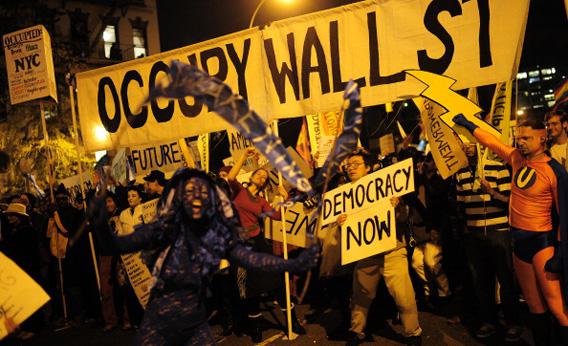This is the question frequently—and properly—asked of Occupy Wall Street and its fans. Those of us who have written and spoken vigorously in support of OWS and for its capacity, almost unparalleled in today’s political environment, to shift our political focus, have an obligation to contribute our answers to the question of what OWS should do. We should answer not because there is any reason for this organic movement—which has done just fine without advice from outsiders—to listen to any of the advice rendered, but because it will help those of us outside the movement clarify our own political ideas. So here are my answers:
From an organizing perspective, OWS should:
- Harness the energy and passion of college students. OWS has an enormous reservoir of support on colleges around the nation. College kids have the time, energy, and voting power to keep a movement going. So announce that on the Friday after Thanksgiving, Nov. 25, when so many college kids are home, there will be special protests at each of the major OWS rally sites. Find an organizer from every college out there and ask her to get 100 kids from her college to show up. This will swell the ranks, expand the base, and show strength! These same students, when they return to campus, can then become the core of the organizing effort going forward. And while you’re at it, ask some well-known musicians who might be sympathetic to the cause to participate. The fact that these rallies would be just after the congressional supercommittee either fails to reach any accord or announces a troubling compromise will only increase the power and import of these rallies.
- Schedule OWS rallies and events at the various State of the State addresses delivered by governors in the first week of the new year. Use the fact that most state media congregate to hear what is usually a rather plebian speech. Create another story for them to cover that day from the capitol. Have college kids throughout the state converge to set forth an agenda for state politics that reflects a new progressive agenda: 10,000 voices demanding a millionaires’ tax in front of any Capitol will be a potent image and lever to persuade a legislature and governor that a new approach is needed. Do this around the nation, and it will send a powerful message about state policies. And schedule a similar event—but larger—in Washington to coincide with the State of the Union.
- Recognize that there is insufficient diversity on the ranks of OWS. This is an opportunity. Send speakers to the mostly African-American and Latino churches where so much of urban minority politics is rooted. New supporters can be found, and the base will be enlarged.
What about OWS and policy? I strongly believe that OWS does not have to deliver a coherent, footnoted package of economic ideas . The job of civil protest is to set—or change— the agenda, not to legislate. Having said that, it would surely help the organizing effort if there were several agreed-upon goals, and those who support the movement should surely be thinking about policies that address the concerns that have been placed on the agenda. Here are a few ideas that I think most OWS supporters could agree upon:
- Call for a full rollback of the Bush tax cuts for all those above $1 million in annual income. Basic fairness is what this movement is about. This would be step one in sharing the burdens to give the country a brighter fiscal future.
- Demand true accountability on Wall Street. The settlements that have been negotiated for flagrant abuses of market power have been inadequate, and the responsible executives have kept their jobs and bonuses. When banks intentionally bet against the very products they have sold to the public, senior executives must be fired.
- Demand that a financial service transaction fee be imposed. It has existed in New York in the past: It worked. It would not only generate much needed revenue, but also, if properly structured, cut down on speculation. Bill Gates supports this concept. It is fundamental, not radical.
- Start a petition drive in every state demanding that the state municipal governments stop using Goldman Sachs for advice and underwriting until Goldman Sachs returns the $12.9 billion dollars it received, from the taxpayers, as a part of the AIG bailout. This conduit payment to Goldman, as made clear in the GAO report that came out earlier this week, remains cloaked in ambiguity and uncertainty. There was no reason for Goldman’s bets to be covered by taxpayers. Make Goldman —and other banks could be subject to this as well —feel the pressure of genuine grass-roots organizing: Tell the elected politicians who chose to pay for Goldman’s services with our tax dollars that we want justice and answers first, before we continue to use Goldman.
- Demand that the New York Fed have “public” board members who truly represent the public—not representatives who lead organizations dominated by the banks, or who are themselves bankers. Recent so-called public representatives have included the CEOs or former CEOs of GE, Goldman, and Lehman Bros. Are they kidding?
